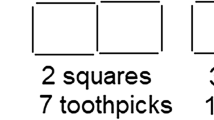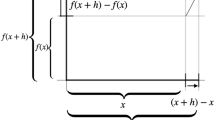Abstract
This paper examines a Special Issue of Educational Studies in Mathematics comprising research reports centred on Peircian semiotics in mathematics education, written by some of the major authors in the area. The paper is targeted at inspecting how subjectivity is understood, or implied, in those reports. It seeks to delineate how the conceptions of subjectivity suggested are defined as a result of their being a function of the domain within which the authors reflexively situate themselves. The paper first considers how such understandings shape concepts of mathematics, students and teachers. It then explores how the research domain is understood by the authors as suggested through their implied positioning in relation to teachers, teacher educators, researchers and other potential readers.
Similar content being viewed by others
Notes
A reviewer of an earlier draft argued that in responding to the Special Issue authors on my agenda rather than theirs I am committing an “ethical violation” in distorting their original meanings. I would respond by arguing that some accounts of contemporary ethics (e.g. Badiou 2001; Butler 2005) are centred on subjects being obliged to operate within oppressive discursive domains rather than on individuals doing their own thing. And such obligations, it has been suggested (Žižek 2008), bring with them support for the agenda built into those domains, which can result in symbolic violence to those disadvantaged in those modes of depiction (e.g. would be problem solvers in a basic competency ethos, collectivists in an individualistic world or vice versa). Thus I see my analysis as an interrogation of the discursive domains that shape the Special Issue authors’ work and my own, as well as school practices, rather than of the individual authors and their intentions. My target is the practices of mathematics teaching in school where ethical violations are held in place by the custom and practice of discursive operations.
I am also guilty of this!
References
Althusser, L. (1971). Ideology and ideological state apparatuses. In L. Althusser (translated by B. Brewster), Lenin and philosophy and other essays (pp. 127–188). London: New Left Books.
Badiou, A. (2001). Ethics. London: Verso.
Barthes, R. (1977). The death of the author. In R. Barthes (selected and edited by S. Heath), Image, music, text (pp. 142–148). London: Fontana.
Bartolini Bussi, M., & Bazzini, L. (2003). Research, practice and theory in didactics of mathematics: Towards dialogue between different fields. Educational Studies in Mathematics, 54(2/3), 203–223. DOI 10.1023/B:EDUC.0000006169.86495.49.
Berger, P., & Luckmann, T. (1972). The social construction of reality. Harmondsworth: Penguin.
Bradford, K., & Brown, T. (2005). C’est n’est pas un circle. For the Learning of Mathematics, 25(1), 16–19.
Brown, T. (1996). Intention and significance in the teaching and learning of mathematics. Journal for Research in Mathematics Education, 27(1), 52–66. DOI 10.2307/749197.
Brown, T. (2001). Mathematics education and language: Interpreting hermeneutics and post-structuralism (2nd ed.). Dordrecht: Kluwer.
Brown, T. (2008a). Lacan, subjectivity and the task of mathematics education research. Educational Studies in Mathematics DOI 10.1007/s10649-007-9111-3.
Brown, T. (2008b). Desire and drive in researcher subjectivity: The broken mirror of Lacan. Qualitative Inquiry, 14(3), 402–423. DOI 10.1177/1077800407311960.
Brown, T. (2008c). Introduction. In T. Brown (Ed.), The psychology of mathematics education: A psychoanalytic displacement. Rotterdam: Sense (in press).
Brown, T., Atkinson, D., & England, J. (2006). Regulative discourses in education: A Lacanian perspective. Bern: Lang.
Brown, T., Hanley, U., Darby, S., & Calder, N. (2007). Teachers’ conceptions of learning philosophies: Discussing context and contextualising discussion. Journal of Mathematics Teacher Education, 10, 183–200. DOI 10.1007/s10857-007-9035-y.
Brown, T., & McNamara, O. (2005). New teacher identity and regulative government: The discursive formation of primary mathematics teacher education. New York: Springer.
Butler, J. (2005). Giving and account of oneself. New York: Fordham University Press.
Castoriadis, C. (1975). The imaginary institution of society. Cambridge: Polity.
Cobb, P., & Bowers, J. S. (1999). Cognitive and situated learning perspectives in theory and practice. Educational Researcher, 28(2), 4–15.
Colapietro, V. (1989). Peirce’s approach to the self. Albany: State University of New York.
Cole, M. (1996). Cultural psychology: a once and future discipline. Cambridge: Belknap.
Colebrook, C. (2007). Graphematics, politics and irony. In M. McQuillan (Ed.), The politics of deconstruction: Jacques Derrida and the other of philosophy (pp. 192–211). London: Pluto.
Confrey, J. (1991). Steering a course between Vygotsky and Piaget. Educational Researcher, 20, 28–32.
Cooper, B., & Dunne, M. (1999). Assessing children’s mathematical ability. Buckingham: Open University Press.
Dowling, P. (1998). The sociology of mathematics education. London: Falmer.
Duval, R. (2006). A cognitive analysis of problems of comprehension in a learning of mathematics. Educational Studies in Mathematics, 61(1, 2), 103–131. DOI 10.1007/s10649-006-0400-z.
Eagleton, T. (2006). The English novel. Oxford: Blackwell.
Ernest, P. (2006). A semiotic perspective of mathematical activity: The case of number. Educational Studies in Mathematics, 61(1, 2), 67–101. DOI 10.1007/s10649-006-6423-7.
Fairclough, N. (1995). Critical discourse analysis. London: Longman.
Foucault, M. (2001). Madness and civilization. London: Routledge.
Gallagher, S. (1992). Hermeneutics and education. Albany: State University of New York Press.
Graven, M. (2004). Investigating mathematics teacher learning within an in-service community of practice. Educational Studies in Mathematics, 57(2), 177–211. DOI 10.1023/B:EDUC.0000049277.40453.4b.
Habermas, J. (1972). Knowledge and human interests. London: Heinemann.
Habermas, J. (1991). Communication and the evolution of society. London: Polity.
Harvey, D. (2006). The limits of capital. London: Verso.
Hodge, R., & Kress, G. (1988). Social semiotics. Ithaca: Cornell University Press.
Hoffmann, M. (2006). What is a “semiotic perspective”, and what could it be? Some comments on the contributions to this Special Issue. Educational Studies in Mathematics, 61(1, 2), 279–291. DOI 10.1007/s10649-006-1456-5.
Lacan, J. (2006). Ecrits. New York: Norton translated by B. Fink.
Laclau, E. (2005). On populist reason. London: Verso.
Lather, P. (2007). Getting lost: Feminist efforts toward a Double(d) science. Albany: SUNY.
Lave, J., & Wenger, E. (1991). Situated learning: Legitimate peripheral participation. Cambridge: Cambridge University Press.
Lemke, J. (1995). Textual politics. London: Taylor and Francis.
Lerman, S., Xu, G., & Tsatsaroni, A. (2002). Developing theories of mathematics education research. Educational Studies in Mathematics, 51(1/2), 23–40. DOI 10.1023/A:1022412318413.
Lovlie, L. (1992). Postmodernism and subjectivity. In S. Kvale (Ed.), Psychology and postmodernism. London: Sage.
Malson, H. (1988). The thin woman, feminism, post-structuralism and the social psychology of anorexia nervosa. London: Routledge.
Morgan, C. (2002). Writing mathematically. London: Taylor and Francis.
Morgan, C. (2006). What does social semiotics have to offer mathematics education research? Educational Studies in Mathematics, 61(1, 2), 219–245. DOI 10.1007/s10649-006-5477-x.
Mouffe, M. (2005). On the political. London: Routledge.
Nancy, J.-L. (2007). On the multiple senses of democracy. In M. McQuillan (Ed.), The politics of deconstruction: Jacques Derrida and the Other of Philosophy (pp. 43–53). London: Pluto.
Nordtug, B. (2004). Subjectivity as an unlimited semiosis: Lacan and Peirce. Studies in Philosophy and Education, 23, 87–102. DOI 10.1023/B:SPED.0000024434.67000.36.
Ongstad, S. (2006). Mathematics and mathematics education as triadic communication? A semiotic framework exemplified. Educational Studies in Mathematics, 61(1-2), 247–277. DOI 10.1007/s10649-006-8302-7.
Otte, M. (2006). Mathematical epistemology from a Peircian semiotic point of view. Educational Studies in Mathematics, 61(1, 2), 11–38. DOI 10.1007/s10649-006-0082-6.
Parker, I. (2007). Revolution in psychology. London: Pluto.
Peirce, C. P. (1958). Collected Papers of Charles Sanders Peirce. Cambridge: Harvard Universiy Press Volumes I–VI, ed. by Charles Hartshorne and Paul Weiss, 1931–1935, Volumes VII–VIII, ed. by Arthur W. Burks; quotations according to volume and paragraph.
Peirce, C. P. (1966). Selected writings: Values in a universe of chance. New York: Dover.
Presmeg, N. (2006). Semiotics and the “connections” standard: significance of semiotics for teachers of mathematics. Educational Studies in Mathematics, 61(1, 2), 163–182. DOI 10.1007/s10649-006-3365-z.
Radford, L. (2006). The anthropology of meaning. Educational Studies in Mathematics, 61(1, 2), 39–65. DOI 10.1007/s10649-006-7136-7.
Ranciere, J. (1998). Disagreement: Politics and philosophy. Minneapolis: University of Minnesota Press.
Ricoeur, P. (1981). Hermeneutics and the human sciences. Cambridge: Cambridge University Press.
Roth, W. M., & Lee, Y. (2004). Interpreting unfamiliar graphs: a generative, activity theoretic model. Educational Studies in Mathematics, 57(2), 265–290. DOI 10.1023/B:EDUC.0000049276.37088.e4.
Saenz-Ludlow, A. (2006). Classroom interpreting games with an illustration. Educational Studies in Mathematics, 61(1, 2), 183–218. DOI 10.1007/s10649-006-5760-x.
Saenz-Ludlow, A., & Presmeg, N. (2006). Guest editorial. Semiotic perspectives on learning mathematics and communicating mathematically. Educational Studies in Mathematics, 61(1, 2), 1–10. DOI 10.1007/s10649-005-9001-5.
Steinbring, H. (2006). What makes a sign a mathematical sign? An epistemological perspective on mathematical interaction. Educational Studies in Mathematics, 61(1, 2), 133–162. DOI 10.1007/s10649-006-5892-z.
Vygotsky, L. (1986). Thought and language. Cambridge: MIT.
Walkerdine, V. (1984). Developmental psychology and the child centred pedagogy. In J. Henriques, W. Hollway, C. Urwin, C. Venn, & V. Walkerdine (Eds.), Changing the subject: Psychology, social regulation and subjectivity. London: Methuen.
Walkerdine, V. (1988). The mastery of reason. London: Routledge.
Walshaw, M. (2004). Mathematics education within the postmodern. Greenwich: Information Age.
Williams, J., & Wake, G. (2007). Black boxes in workplace mathematics. Educational Studies in Mathematics, 64(3), 317–343. DOI 10.1007/s10649-006-9039-z.
Žižek, S. (2006). The parallax view. Cambridge: MIT.
Žižek, S. (2008). Violence. London: Profile.
Author information
Authors and Affiliations
Corresponding author
Rights and permissions
About this article
Cite this article
Brown, T. Signifying “students”, “teachers” and “mathematics”: a reading of a special issue. Educ Stud Math 69, 249–263 (2008). https://doi.org/10.1007/s10649-008-9130-8
Received:
Accepted:
Published:
Issue Date:
DOI: https://doi.org/10.1007/s10649-008-9130-8




